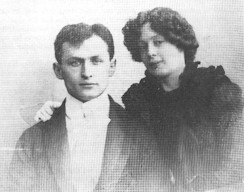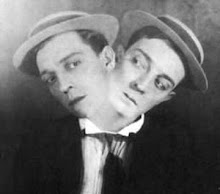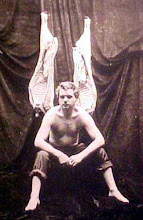So the previous entry "Postcards From the Edge" was an old idea meant to be workshopped here with an eye on submission to McSweeneys Internet Tendency, which I thought suited the tenor of the piece, anchored as it is to easy wordplay and pop-obscure allusion. Turns out I was right, because McSweeneys published somebody else's version of the same concept last year:
http://www.mcsweeneys.net/2006/10/20malla.html
This writer takes a different approach, tracing U2's career through the ages and ultimately it's a MUCH more polished piece than mine. And funny. The writer has published extensively on McSweeneys.net as well as on Nerve.com and a number of other lesser-known literary-type-places.
I could swear that I rehearsed a voiceover version of this in a bad Irish accent on a disgusting plaid couch in Boston before I ever even journeyed midwestward, so over FOUR years ago. I could swear. But maybe my mind plays tricks and I unwittingly plucked the idea out of the ether. It's possible the memory is fabricated or out of sequence. This, ultimately, is why we write things down. As a supplement to our cobwebbed memories. It's an idea at least as old as Plato's Phaedrus. So this is the marshy terrain of intellectual property. I thought of it, you thought of it ... but if you write it down (and publish it), you stick a flag in the idea and all else is relegated to the status of hearsay.
Coincidentally, just a week or so ago, I dealt with plagiarism in a student's paper for the first time. I was incensed, and then saddened, and then nervous and she was contrite and then tears... But then I was shaken from my righteousness by a conversation that roused a dormant memory. I cheated when I was an undergraduate too. I went out to do godknowswhat and roommate and energetic philosopher Mike wrote my paper on Rousseau. He may have even volunteered to do it (he would read Nietzsche WHILE doing pushups). It's not the same as pasting sentences from Sparknotes into your paper, but still cheating.
AND THEN (as if life spun out like the "threads" of the web) last night, I finally saw the documentary about Marla Olmstead, four year old painter. And though her story certainly does generate questions about modern art and its interpretations, Marla's paintings seem to be a HOAX of the first order, which resonated with the discussion of my dissertation writing group earlier that day, as a friend and colleague is writing about "fake" autobiographies (I just now realized she should call this chapter "Grand Theft Auto," a stolen self). She's looking at early 20th century examples like James Weldon Johnson's "Autobiography of an Ex-Coloured Man," which was a fiction presented as fact in 1912 to cash in on the cache of African-American true-life testimony that had currency since the slave narrative and then re-presented as a novel during the Harlem Renaissance, when it was ok for a black man to be outed as an avant-garde Modernist . But it made me think of Oprah-disgraced James Frye or doubts clouding the veracity of Dave Eggers pomo-memoir. In each case, it's a convoluted idea market.
To sum up: sometimes you get there and there's already a flag. Sometimes you plant your flag in someone else's rightful spot. Sometimes you willfully plant the wrong flag.
Subscribe to:
Post Comments (Atom)







































2 comments:
It's cool to read your writing. I totally remember that crusty plaid couch.
I guess the one thing film does establish about the nature of Modern Art is that, really, its meaning continues to depend on who the artist is. If we take into question the nature of modernism itself, of course this is no shock.
Still, I wonder, what would have happened if the parents had said from the beginning (if, that is, they did help out the kid) that she was getting direction? I mean, child mathematicians get taught math, child musicians are expected to get training from their music teachers, etc. What is it about art that insists that it be completely "original"?
Post a Comment